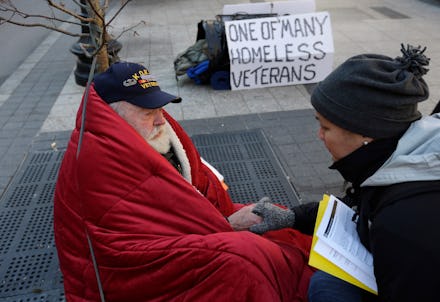This Major City Just Became the First in America to End Homelessness Among Veterans

In a major accomplishment that will hopefully serve as a model for cities around the country, New Orleans has become the first city in the United States to end homelessness among its veteran population, according to ThinkProgress.
"I am honored and very pleased to report that we have housed 227 veterans, exceeding our goal of 193, thanks to the hard work of our committed partners," Democratic Mayor Mitch Landrieu announced. "New Orleans is now the first major city in the nation to answer the president and first lady's call to end veteran homelessness – and we did so one year earlier than the federal goal."
The background: In 2014, first lady Michelle Obama proposed a challenge encouraging state and local officials to end veteran homelessness in their cities by the end of 2015. So far, 312 mayors, six governors, and 71 other county or city officials across the country have taken up the challenge. New Orleans has been the first to accomplish the goal — well in advance of the proposed deadline.
In the spring of 2014, UNITY of Greater New Orleans, a nonprofit that provides housing and services to the homeless, used surveys to estimate that there were 193 homeless veterans in the city. The Times-Picayune reports that UNITY worked through the rest of the year with a coalition including the U.S. Department of Veterans Affairs, the Housing Authority of New Orleans and a handful of other nonprofits to obtain permanent supportive housing for them.
"The Landrieu administration achieved its goal by bringing together organizations and agencies that previously didn't collaborate or share data and, by doing so, created a rapid response system that can house veterans within an average of 30 days," reports the Times-Picayune.
The housing was brought about through a number of initiatives, including the renovation of a convent and old school buildings.
"Of course you understand that going forward, it's not like no one is ever going to become homeless again, but it's about having a rapid response system in place so that the number of veterans who are in homelessness at any given point is never more than what you can house that month," UNITY Director Martha Kegel told ThinkProgress.
A model for ending all homelessness: New Orleans' hands-on, housing-centric approach to its homeless veterans will hopefully serve as a model for assisting its entire homeless population. Many cities across the country have done the opposite; in recent years, nearly 200 cities have passed ordinances designed to effectively outlaw or expel the homeless by creating restrictions on public encampments, public food donations and the like. Most cities have inadequate and poorly orchestrated resources for their homeless populations, which ends up costing them more than addressing the issue through methodical assistance.
According to Common Ground, an organization that embraces a progressive model for solving homelessness, more than half of homeless single adults in the U.S. suffer from mental illness, substance abuse and chronic health problems. These kinds of problems are not going to be solved by ad hoc soup kitchens and shelters or lofty rhetoric about ending poverty.
Common Ground observes that without access to resources that address their fundamental problems, much of the homeless population ends up "cycling repeatedly through emergency rooms, psychiatric hospitals and jails (the most costly 'shelters' of all)." Their research shows that supportive housing for homeless people afflicted by a mental illness costs the state less than half of what veering from one crisis to another does:
Ending homelessness is complex public policy domain that requires a great deal of coordination that most cities are not eager to allocate resources for, but it's both sounder policy and more humane to tackle the issue head on rather than sweep it under the rug.
h/t ThinkProgress